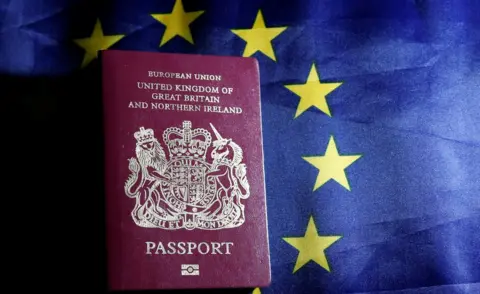Brexit: New move to keep EU citizenship for UK nationals
 Getty Images
Getty ImagesA petition is under way to make EU citizenship permanent, despite the probability that UK nationals will lose it after Brexit.
The European Commission will register the initiative on Monday. Petitioners will need to get a total of at least one million signatures that includes residents in at least seven EU nations.
It is a European Citizens' Initiative (ECI) - a method for changing EU law.
EU citizenship guarantees freedom of movement in the EU and other rights.
The UK organiser of the petition, Anthony Simpson, told the BBC that "the point is to raise the issue - a lot of UK nationals don't understand they are also EU citizens".
A member of the Bertrand Russell Peace Foundation, he said there was a need for legal clarity on EU citizenship and "the European Court of Justice (ECJ) remains pivotal in all this".

What is EU citizenship?
EU citizenship is described in Article 20 of the Treaty on the Functioning of the European Union and includes the rights to:
- Travel and live anywhere in the EU
- Vote and stand as a candidate in European and local elections in another EU country
- Get diplomatic protection and consular help from any other EU country in another part of the world.
The EU treaties say EU citizenship "does not replace national citizenship" but "is additional to it". So EU citizenship cannot be acquired by giving up UK citizenship.

Mr Simpson said his ECI petition was free, but a £2,500 private donation had been used to promote the campaign on social media and "we have developed a lot more contacts" in the EU.
His earlier ECI, called "Retaining European Citizenship", got only 24,000 signatures.
The UK is on course to leave the EU on 29 March 2019 - two years after Prime Minister Theresa May triggered the exit process by invoking Article 50.
The UK has also negotiated a transition period lasting until the end of 2020, during which freedom of movement will remain effective.
Those deadlines could well scupper the attempt to keep EU citizenship for UK nationals.
 Reuters
ReutersRead more on this topic:
Once registered by the Commission, an ECI has one year in which to collect at least a million signatures of support. Even if that happens, the Commission is only required to consider the petition or reject it - there is no obligation to make it law.
The UK government and some experts on European law argue that Brexit will automatically strip UK nationals of their EU citizenship. But the UK's future legal ties with the EU still have to be worked out.
Treaty change problem
In a parliamentary answer on the citizenship question, Lord Ahmad of the Foreign Office said "when the UK ceases to be a member of the European Union, British nationals will no longer hold EU citizenship, unless they hold dual nationality with another EU member state".
Lord Callanan of the Brexit department DExEU said retaining EU citizenship for Britons post-Brexit had not been ruled out, but it "would involve changing treaties". "The other side [EU negotiators] has shown no interest whatever in doing it," he added.
Legal opinions on the EU citizenship question are quoted by the House of Commons Library.
Brexit makes it unlikely that in future UK nationals will be able to appeal to the ECJ if they feel their rights have been violated. One of Brexit's key aims is to restore full jurisdiction to UK courts.
An important aspect of EU citizenship is that it provides reciprocal healthcare arrangements - including the EHIC card for medical emergencies abroad.
There is also a complex web of reciprocal social welfare arrangements in the EU.
The UK and EU have reached a deal to protect the rights of the 3.2 million EU citizens in the UK and estimated 1.2 million UK citizens living in other EU countries.
But many details still have to be negotiated, and they will take effect only if an overall Brexit deal is signed off.
